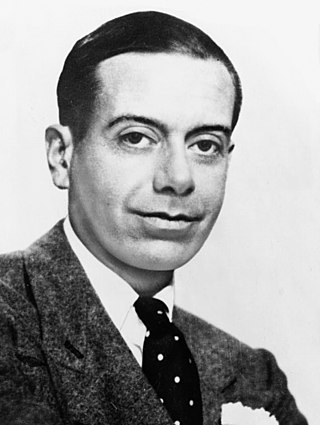
Cole Albert Porter was an American composer and songwriter. Many of his songs became standards noted for their witty, urbane lyrics, and many of his scores found success on Broadway and in Hollywood films.

James Francis Durante was an American comedian, actor, singer, and pianist. His distinctive gravelly speech, Lower East Side accent, comic language-butchery, jazz-influenced songs, and prominent nose helped make him one of the United States' most familiar and popular personalities of the 1920s through the 1970s. He often referred to his nose as the schnozzola, and the word became his nickname.

Fifty Million Frenchmen is a musical comedy with a book by Herbert Fields and music and lyrics by Cole Porter. It opened on Broadway in 1929 and was adapted for a film two years later. The title is a reference to the hit 1927 song "Fifty Million Frenchmen Can't Be Wrong" by Willie Raskin, Billy Rose, and Fred Fisher, which compared free attitudes in 1920s Paris with censorship and prohibition in the United States. The musical's plot is consistent with the standard boy-meets-girl plots of musical comedies of the first half of the twentieth century.
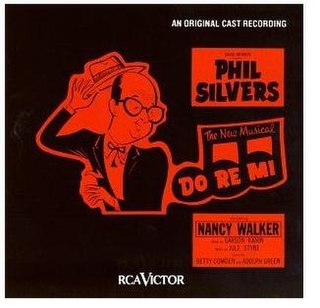
Do Re Mi is a musical with music by Jule Styne, lyrics by Betty Comden and Adolph Green, and a book by Garson Kanin, who also directed the original 1960 Broadway production. The plot centers on a minor-league con man who decides to go (somewhat) straight by moving into the legitimate business of juke boxes and music promotion. The musical was headlined by the comedy couple of Phil Silvers and Nancy Walker, both of whom were Tony nominated. Popular songs introduced included "Cry Like the Wind" and "Make Someone Happy".

Panama Hattie is a 1940 American musical with music and lyrics by Cole Porter and book by Herbert Fields and B. G. DeSylva. The musical is about a nightclub owner, Hattie Maloney, who lives in the Panama Canal Zone and ends up dealing with both romantic and military intrigue. The title is a play on words, referring to the popular Panama hat.

Jubilee is a musical comedy with a book by Moss Hart and music and lyrics by Cole Porter. It premiered on Broadway in 1935 to rapturous reviews. Inspired by the recent Silver Jubilee of George V of Great Britain, the story is of the royal family of a fictional European country. Several of its songs, especially "Begin the Beguine" and "Just One of Those Things", became independently popular and have become part of the American Songbook.

Gay Divorce is a musical with music and lyrics by Cole Porter and book by Dwight Taylor, adapted by Kenneth Webb and Samuel Hoffenstein. It was Fred Astaire's last Broadway show and featured the hit song "Night and Day" in which Astaire danced with co-star Claire Luce.

Silk Stockings is a musical with a book by George S. Kaufman, Leueen MacGrath, and Abe Burrows and music and lyrics by Cole Porter. The musical is loosely based on the Melchior Lengyel story Ninotchka and the 1939 film adaptation it inspired. It ran on Broadway in 1955. This was the last musical that Porter wrote for the stage.
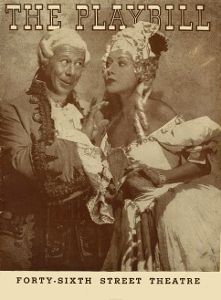
Du Barry Was a Lady is a Broadway musical, with music and lyrics by Cole Porter, and the book by Herbert Fields and Buddy DeSylva. The musical starred Bert Lahr, Ethel Merman and Betty Grable, and the song "Friendship" was one of the highlights. The musical was made into a 1943 Technicolor film Du Barry Was a Lady, starring Red Skelton, Lucille Ball, Gene Kelly and Tommy Dorsey and his orchestra.
Paris is a musical with the book by Martin Brown, and music and lyrics by Cole Porter, as well as Walter Kollo and Louis Alter (music) and E. Ray Goetz and Roy Turk (lyrics). The musical, which premiered on Broadway in 1928, was Porter's first Broadway hit. The musical introduced the song "Let's Do It, Let's Fall in Love" sung by the show's star, Irene Bordoni. The story involves a young man from a very proper family in Newton, Massachusetts whose mother is horrified by his intention to wed a French actress.
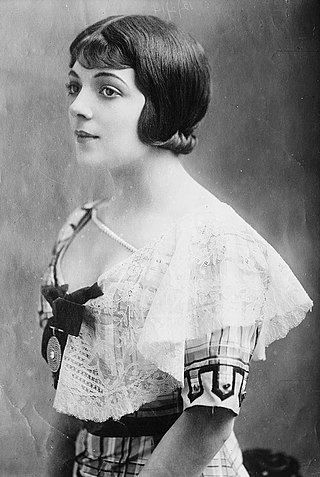
Irène Bordoni was a Franco-American actress and singer.

Out of This World is a musical with music and lyrics by Cole Porter, and the book by Dwight Taylor and Reginald Lawrence. The show, an adaptation of Plautus's comedy Amphitryon, first opened on Broadway in 1950.

Let's Face It! is a musical with music and lyrics by Cole Porter. The book by Herbert and Dorothy Fields is based on the 1925 play The Cradle Snatchers by Russell Medcraft and Norma Mitchell.
Show Girl is a musical by William Anthony McGuire that ran from Jul 2, 1929 to Oct 5, 1929. A backstage musical, much of the action of the musical's story takes place at the Ziegfeld Theatre in New York City. Other scenes take place in Trenton, New Jersey; Brooklyn; and at a Penthouse apartment in New York City. The show tells the story of aspiring Broadway showgirl Dixie Dugan as she is pursued by four suitors. The music was written by George Gershwin, with lyrics by Ira Gershwin and Gus Kahn.

Mexican Hayride is a musical with a book by Herbert Fields and Dorothy Fields and music and lyrics by Cole Porter. The show opened on Broadway in 1944.
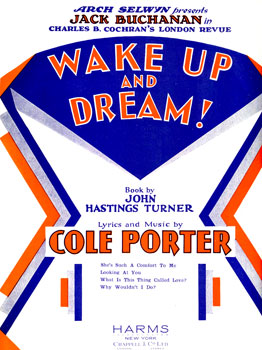
Wake Up and Dream is a musical revue with a book by John Hastings Turner and music and lyrics by Cole Porter and others. The most famous song from the revue is the Porter standard "What Is This Thing Called Love?"

You Never Know is a musical with a book by Rowland Leigh, adapted from the original European play By Candlelight, by Siegfried Geyer and Karl Farkas, with music by Cole Porter and Robert Katscher, lyrics by Cole Porter, additional lyrics by Leigh and Edwin Gilbert, directed by Leigh, and songs by others.

Around the World is a musical based on the 1873 Jules Verne novel Around the World in Eighty Days, with a book by Orson Welles and music and lyrics by Cole Porter. It involves an around-the-world adventure by Phileas Fogg. The expensive musical extravaganza opened on Broadway in May 1946 but closed after 75 performances.
Hitchy-Koo of 1919 is a musical revue with music and lyrics by Cole Porter and a book by George V. Hobart. This revue was third in a series of four Hitchy-Koo Broadway revues from 1917 to 1920 produced by, and starring, Raymond Hitchcock. The revues were named after the 1912 popular song "Hitchy-Koo" by composers Lewis F. Muir and Maurice Abrahams with lyrics by L. Wolfe Gilbert; the only song which was featured in all of the Hitchy-Koo revues. The original Broadway production of this version played in 1919. The revue received favourable reviews.
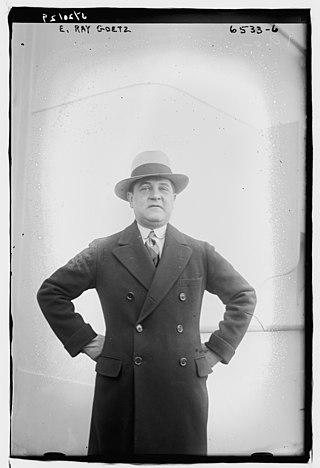
Edward Ray Goetz was an American composer, lyricist, playwright, theatre director, and theatrical producer. A Tin Pan Alley songwriter, he published more than 500 songs during his career, many of them originally written for the New York stage. His songs were recorded by several artists, including Judy Garland, Al Jolson, and Blossom Seeley. He was active as both a lyricist and composer for Broadway musicals from 1906 through to 1930, collaborating with artists like George Gershwin, Cole Porter, Sigmund Romberg, and A. Baldwin Sloane to create material for the theatre.

















